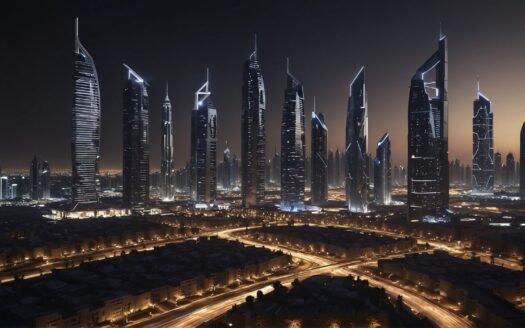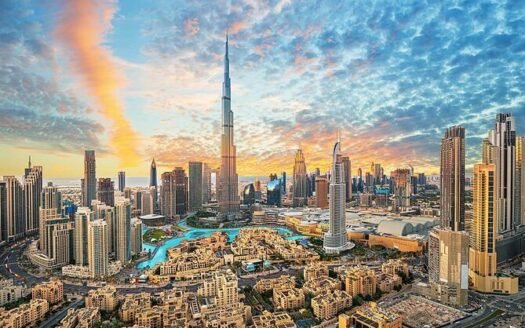The Economic Impact of Dubai’s Real Estate Boom on the MENA Region
Dubai’s real estate sector has experienced unprecedented growth in recent years, establishing itself as one of the most dynamic markets in the world. This boom is not only transforming the city’s skyline but is also having a ripple effect across the broader MENA (Middle East and North Africa) region. As a hub for global business, tourism, and investment, Dubai’s thriving property market is driving economic growth, creating jobs, and spurring development throughout the region. In this blog, we will explore how Dubai’s real estate boom is impacting the MENA economy and shaping the future of the region.
1. Real Estate Boom and Economic Growth
Dubai’s real estate sector has become a vital engine of economic growth in the MENA region. The demand for both residential and commercial properties has surged as Dubai continues to attract international investors, businesses, and expatriates. With favorable government policies and strong investor confidence, the city’s real estate market has seen consistent demand, even in the face of global uncertainties. This growth is contributing significantly to Dubai’s GDP and positioning the city as a key player in the global property market.
The spillover effects of Dubai’s real estate success are being felt throughout the MENA region. Countries such as Saudi Arabia, Egypt, and Morocco are seeing increased interest in their property markets, as regional investors look to capitalize on similar growth trajectories. The rise of affordable housing, in particular, is playing a crucial role in boosting real estate sectors across the region, providing more opportunities for middle-income earners and driving economic development (Economy Middle East).
2. Job Creation and Economic Diversification
One of the most significant economic impacts of Dubai’s real estate boom is its contribution to job creation. The construction industry, a key pillar of the real estate sector, has provided thousands of jobs, from skilled laborers to engineers and project managers. In addition to direct employment in construction, the real estate boom is also driving demand in related industries such as finance, property management, and real estate marketing, further expanding employment opportunities.
Moreover, the real estate sector is playing a key role in Dubai’s economic diversification efforts. By attracting foreign investment and promoting the development of tourism, hospitality, and retail, Dubai is reducing its reliance on oil revenues. The growth of mixed-use developments, luxury hotels, and retail spaces is helping to transform the city into a global business and entertainment hub, benefiting both the local and regional economies (The National).
3. Regional Leadership and Influence
Dubai’s real estate boom has also solidified its position as a leader in the MENA region’s property market. The city’s high-profile developments, such as the iconic Burj Khalifa and Palm Jumeirah, have set a benchmark for architectural excellence and innovation, influencing other cities in the region to follow suit. Developers across the MENA region are looking to Dubai’s success as a blueprint for their own growth, adopting similar strategies to attract international investment and create world-class developments.
The leadership of CEOs and influential figures in Dubai’s real estate sector is also driving transformation across the region. These leaders are not only shaping the future of Dubai’s property market but also playing pivotal roles in expanding the real estate landscape across the MENA region. Their vision and innovative approaches are setting the standard for urban development, sustainability, and smart cities in the region (Arabian Business).
4. Impact on the Tourism and Hospitality Sectors
Tourism has long been a major driver of economic growth in Dubai, and the real estate boom is further fueling this trend. The development of luxury hotels, resorts, and entertainment facilities is attracting tourists from around the world, enhancing Dubai’s status as a global tourism destination. These real estate-driven developments are boosting the local economy by creating new jobs, increasing tourist spending, and promoting the city as a hub for international events and exhibitions.
As the tourism and hospitality sectors thrive in Dubai, the benefits extend to neighboring countries in the MENA region. Increased tourism to the UAE often results in spillover effects, with travelers visiting other regional destinations, contributing to the overall growth of the MENA tourism market. The continued development of integrated resorts, theme parks, and retail complexes in Dubai is expected to draw even more visitors to the region, benefiting the broader MENA economy (Khaleej Times).
Conclusion
Dubai’s real estate boom is more than just a local success story—it is having a profound impact on the broader MENA region. By driving economic growth, creating jobs, and spurring investment in related sectors such as tourism and hospitality, Dubai is helping to shape the future of the regional economy. As other countries in the MENA region look to emulate Dubai’s real estate success, the ripple effects of this boom will continue to be felt across the region, positioning the MENA property market for sustained growth and innovation in the years to come.
Somi Finance: Keep up to Date with Dubai’s Real Estate Progress
Learn how real estate crowdfunding is revolutionizing property investment in the UAE and creating new opportunities for investors Read more
Learn the newest trends and profiles of potential at Somi Finance for two significant industries of Dubai – the financial industry and the real estate industry.







